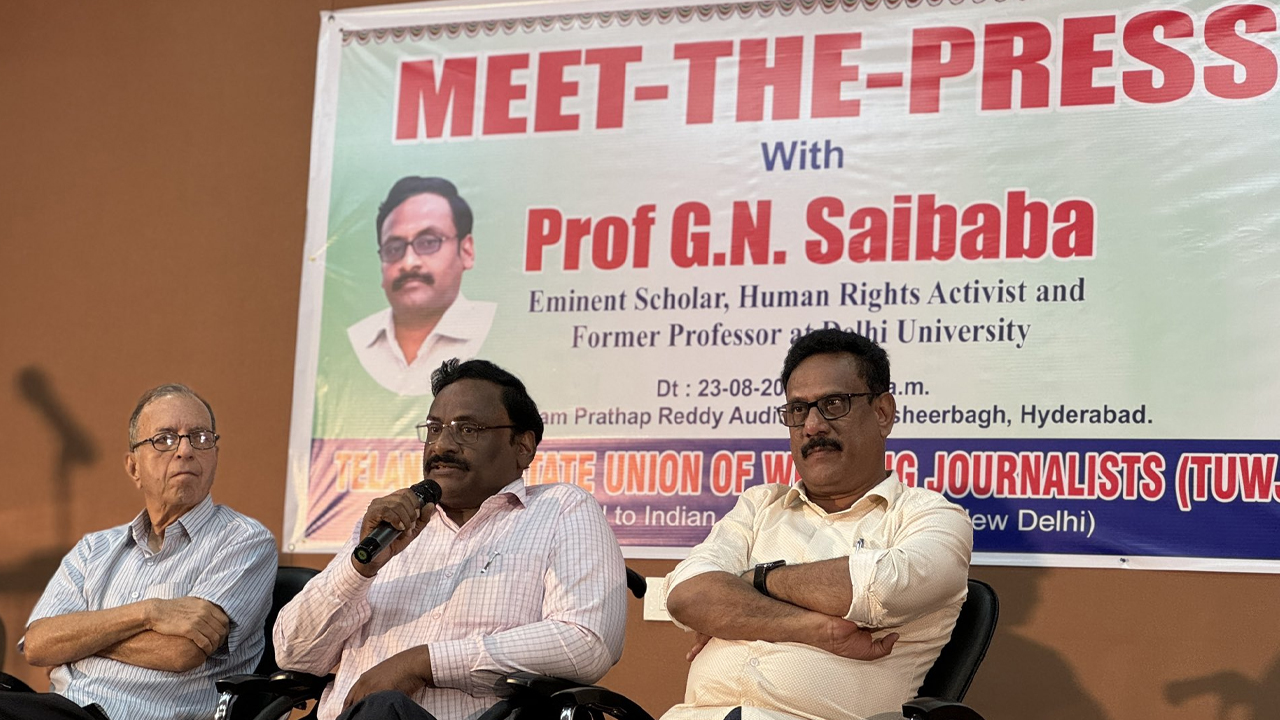Prof Saibaba recalled his nine years of solitary prison life in the ‘anda cell’ of Nagpur jail in a first ever interview with journalists after his release from prison.
A report by Harsh Thakor
Former professor of English at Delhi University’s Ram Lal Anand College, Dr G.N. Saibaba, a political prisoner who was acquitted of the charges against him under the Unlawful Activities (Prevention) Act, narrated the tormenting experience of imprisonment in a press meeting with members of the Telangana State Union of Working Journalists (TSUWJ) last Friday on August 23.
Prof Saibaba was accused of links with the banned Maoist organisation, was convicted by a sessions court in 2017, and sentenced to life imprisonment. He was acquitted of the charges under Unlawful Activities (Prevention) Act by the Nagpur bench of the Bombay High Court on October 14, 2022.
Prof Saibaba narrated a most gripping account of how India is fast degenerating into a proto-fascist state and how conditions in prisons equalled and even surpassed the barbarity of colonial days. He stressed that it is imperative to conduct a movement for rights of political prisoners, which are today scarred at an unparalleled scale.
Most pertinently, he also summarised how casteism was rampant in jails; how prisons robbed human beings of their dignity.
Prof Saibaba spoke about how his nervous system was damaged during his arrest and no treatment was provided for the same. “At the time of my arrest at Aheri police station, my wheelchair got damaged while I was being taken into the police station. But the policemen kept dragging me in it and I suffered an injury, which had a deep impact on my nervous system,” he said. After he was shifted to Nagpur jail, he alleged that he faced extreme difficulty in accessing a washroom and was kept in the ‘anda’ cell, where he found it hard to get sufficient oxygen.
“I always look forward to the future. I don’t regret my past 10 years. I am not going to lose anything. And, I can recover,” he said. Saibaba’s sheer optimism after the 10 years of dark days was a testimony of human courage and spirit of liberation.
Condemning the horrific conditions in the jail, he said that it was unjust for even criminals to be kept in such conditions. “Never in my life had I felt that I am a disabled person. But the jail authorities made me realise that I am disabled for the first time in my life,” he said.
Prof Saibaba also narrated how his bail petitions, applications for parole to attend his mother’s funeral were rejected, and how he was left to languish in solitary confinement.
Answering a question on whether the conditions changed in Telangana after formation of a separate state, the professor said that the region has been freed from the clutches of rulers of two castes and one region.
“Prison is a microcosm of the external world, where all the societal evils are even more pronounced than outside,” said Dr Saibaba. “Caste-based discrimination is rampant in prison, and works are assigned based on the caste of inmates. In fact, assignment of jobs based on caste is mentioned in the jail manual too,” added Dr Saibaba.
The amended Prisons Act 1894 provides for ‘mild bodily torture’ as a means to control and discipline prisoners, which is in violation of the constitution. While there is no method of protest against such a system except through a hunger strike, even that would bear no fruit unless backed by voices from outside the prison.
Under the pretext of mild torture, all prisoners are mercilessly beaten up upon arrival without any reason. The only exceptions are gangsters, politicians of repute and ‘Naxal cases’, Dr Saibaba said.
“When Anil Deshmukh visited me in prison as Home Minister in the Congress and NCP coalition, I asked him for better conditions for prisoners. But he sought to know what I wanted for myself. Later, he was jailed, and experienced the conditions first hand,” Dr Saibaba said.
Similar experiences were shared by Shiv Sena MP Sanjay Raut and businessman Naresh Goyal too, and yet there is no change in the conditions.
“After seeing all this, my opinion is that nobody should be sent to prison. Prison is a system that robs human beings of their value,” Dr Saibaba said.
Brushing through the period that led to his arrest, Dr Saibaba said he was tormented by a posse of officials, including Maharashtra police, thrice before the arrest, to suppress his campaign as convenor of the ‘Forum Against War On People’ against Operation Green Hunt.
“Hany Babu had done some exceptional work in the field of Linguistics and had no part in any activism except for our combined fight for implementation of reservation in Delhi University. He is now in jail, and almost lost his eyesight during COVID-19 time,” Dr Saibaba said.
While Bench-hunting is severely castigated by the judiciary, even unlettered inmates of the prison discuss which Bench would give a favourable order, Dr Saibaba said. “They would tell me in which Bench my bail petition stood a better chance. General population is looking at a Judge as an individual and not as a system. All of them know that court orders depend on judges,” Dr Saibaba said, recounting how his bail petitions were either rejected or never came up for hearing, and how the hearing on student activist Gulfisha Fatima’s bail petition was listed 65 times, but never came up for hearing.
(Harsh Thakor is a freelance journalist. Thanks for the information from Indian Express and Red Spark.)

